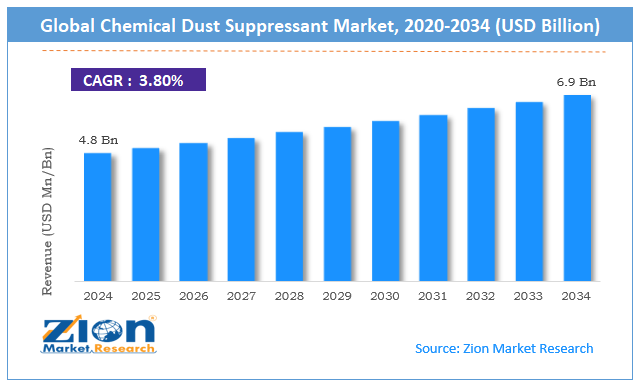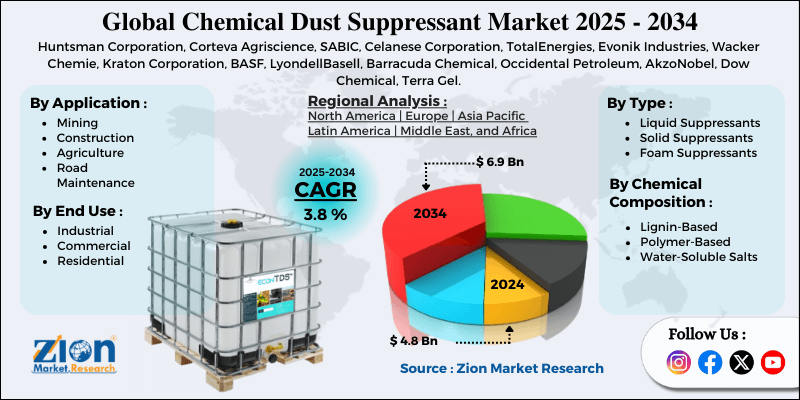Chemical Dust Suppressant Market Size, Share, Trends, Growth 2034

Chemical Dust Suppressant Market By Type (Liquid Suppressants, Solid Suppressants, and Foam Suppressants), By Chemical Composition (Lignin-Based, Polymer-Based, and Water-Soluble Salts), By Application (Mining, Construction, Agriculture, and Road Maintenance), By End Use (Industrial, Commercial, and Residential), and By Region - Global and Regional Industry Overview, Market Intelligence, Comprehensive Analysis, Historical Data, and Forecasts 2025 - 2034
| Market Size in 2024 | Market Forecast in 2034 | CAGR (in %) | Base Year |
|---|---|---|---|
| USD 4.8 Billion | USD 6.9 Billion | 3.80% | 2024 |
Chemical Dust Suppressant Industry Prospective:
The global chemical dust suppressant market size was worth around USD 4.8 billion in 2024 and is predicted to grow to around USD 6.9 billion by 2034, with a compound annual growth rate (CAGR) of roughly 3.8% between 2025 and 2034.
Chemical Dust Suppressant Market: Overview
In many different sectors, including manufacturing, construction, and mining, chemical dust suppression is the application of precisely created chemical agents to reduce or control dust emissions.
Usually used in areas where dust is generated, these compounds link two particles together or make the dust heavy to prevent it from flying. Chemical dust suppressants are a variety of chemicals, including polymers, surfactants, and salts. Their mechanism is either building a crust on their surface or attracting moisture to the dust particles. These substances can negatively affect the environment even if they are beneficial. Thus, their safe application depends on careful choice and control.
Key Insights
- As per the analysis shared by our research analyst, the global chemical dust suppressant market is estimated to grow annually at a CAGR of around 3.8% over the forecast period (2025-2034).
- In terms of revenue, the global chemical dust suppressant market size was valued at around USD 4.8 billion in 2024 and is projected to reach USD 6.9 billion by 2034.
- The growing construction industry is expected to drive the chemical dust suppressant market over the forecast period.
- Based on the type, the liquid suppressants segment is expected to hold the largest market share over the forecast period.
- Based on its chemical composition, the polymer-based segment is expected to dominate the market expansion over the projected period.
- Based on the application, the construction segment is expected to dominate the market expansion over the projected period.
- Based on the end use, the industrial segment is expected to dominate the market expansion over the projected period.
- Based on region, the Asia Pacific is expected to dominate the market during the forecast period.
Chemical Dust Suppressant Market: Growth Drivers
Increasing development of infrastructure drives market growth
Development of infrastructure encompasses a broad spectrum of building projects, including road, bridge, commercial, and residential construction.
Particularly while excavating, transporting dirt, and moving objects, these activities generate a lot of dust. Maintaining a safe and healthy workplace, ensuring adherence to environmental rules, and regulating and lowering airborne dust particles depend on dust suppressants. This is therefore accelerating the growth of the chemical dust suppressant market.
Chemical Dust Suppressant Market: Restraints
The high cost of technology hinders market growth
Dust suppression supplies and application methods can be expensive, especially for lengthy or extensive projects. Exorbitant costs put off potential buyers, particularly in places with few resources or enterprises. Market expansion is also impacted by rivalry in manufacturers’ prices. It may be difficult for the industry to compare and select the best available solutions due to the absence of standardized techniques to assess the efficacy of dust suppression and control strategies. This would also limit the growth of the chemical dust suppressant industry.
Chemical Dust Suppressant Market: Opportunities
Growing awareness regarding health and safety offers a lucrative opportunity for market growth
Communities and companies are becoming more conscious of the health and safety risks associated with dust and particulate matter. Due to the rising investments in dust suppression technologies brought about by this awareness, many firms now consider the Chemical Dust Suppressants Market Industry to be of utmost importance.
Employers are increasingly prioritizing worker health protection, particularly in industries where dust exposure is a major problem, such as manufacturing, mining, and construction. By using efficient dust suppressants, respiratory illnesses and other health issues brought on by poor air quality can be decreased. The need for superior chemical dust suppressants is driven by organizations' recognition of the need to preserve a safe working environment.
The industry is expected to grow rapidly as safety regulations tighten, serving sectors eager to reduce health hazards and enhance working conditions.
Chemical Dust Suppressant Market: Challenges
Environmental and regulatory concern poses a major challenge to market expansion
Environmental and legal concerns significantly impact the market for chemical dust suppressants. Governments and environmental groups throughout the world implement strict policies to lessen the detrimental impacts of dust suppressants on the environment and human health.
Like magnesium and calcium chloride, chloride-based suppressants can contaminate soil and water supplies, increasing salinity and harming vegetation. Petroleum-derived suppressants could spew hydrocarbons into the environment, contaminating groundwater and degrading soil. Furthermore, certain chemical suppressants release volatile organic compounds (VOCs), which aggravate air pollution.
Worker safety laws were developed in response to long-term contact with dust treated with chemicals that aggravate the skin and generate respiratory issues.
Chemical Dust Suppressant Market: Report Scope
| Report Attributes | Report Details |
|---|---|
| Report Name | Chemical Dust Suppressant Market |
| Market Size in 2024 | USD 4.8 Billion |
| Market Forecast in 2034 | USD 6.9 Billion |
| Growth Rate | CAGR of 3.8% |
| Number of Pages | 212 |
| Key Companies Covered | Huntsman Corporation, Corteva Agriscience, SABIC, Celanese Corporation, TotalEnergies, Evonik Industries, Wacker Chemie, Kraton Corporation, BASF, LyondellBasell, Barracuda Chemical, Occidental Petroleum, AkzoNobel, Dow Chemical, Terra Gel, and others. |
| Segments Covered | By Type, By Chemical Composition, By Application, By End-Use, and By Region |
| Regions Covered | North America, Europe, Asia Pacific (APAC), Latin America, Middle East, and Africa (MEA) |
| Base Year | 2024 |
| Historical Year | 2019 to 2023 |
| Forecast Year | 2025 - 2034 |
| Customization Scope | Avail customized purchase options to meet your exact research needs. Request For Customization |
Chemical Dust Suppressant Market: Segmentation
The global chemical dust suppressant industry is segmented based on type, chemical composition, application, end use, and region.
Based on the type, the global chemical dust suppressant market is bifurcated into liquid suppressants, solid suppressants, and foam suppressants. The liquid suppressants segment is expected to hold the largest market share over the forecast period. Increasing awareness about the health risks associated with airborne dust has led industries to invest in dust control solutions to protect workers and nearby communities.
Based on chemical composition, the global chemical dust suppressant industry is bifurcated into lignin-based, polymer-based, and water-soluble salts. The polymer-based segment is expected to dominate the market expansion over the projected period. The segment expansion is driven by environmental regulations, industrial expansion, and technological advancements.
Based on the application, the global chemical dust suppressant market is bifurcated into mining, construction, agriculture, and road maintenance. The construction segment is expected to hold the largest market share over the forecast period. The segment's dominance is mostly driven by the rising investment in the construction sector.
Based on the end use, the global chemical dust suppressant industry is bifurcated into industrial, commercial, and residential. The industrial segment captures the largest market share over the forecast period due to fast industrialization, especially in developing economies.
Chemical Dust Suppressant Market: Regional Analysis
The Asia Pacific dominates the market over the projected period
The Asia Pacific is expected to dominate the global chemical dust suppressant market. Due to the Asia-Pacific region's rapidly expanding mining, building, and manufacturing industries, effective dust management techniques are necessary to ensure worker safety and regulatory compliance.
In addition, governments are enforcing more stringent environmental regulations to cut down on dust emissions, which forces businesses to use chemical suppressants. Additionally, the use of dust suppression systems to safeguard employees and surrounding populations is being fueled by growing awareness of the health hazards connected to dust exposure.
Chemical Dust Suppressant Market: Competitive Analysis
The global chemical dust suppressant market is dominated by players like
- Huntsman Corporation
- Corteva Agriscience
- SABIC
- Celanese Corporation
- TotalEnergies
- Evonik Industries
- Wacker Chemie
- Kraton Corporation
- BASF
- LyondellBasell
- Barracuda Chemical
- Occidental Petroleum
- AkzoNobel
- Dow Chemical
- Terra Gel
The global chemical dust suppressant market is segmented as follows:
By Type
- Liquid Suppressants
- Solid Suppressants
- Foam Suppressants
By Chemical Composition
- Lignin-Based
- Polymer-Based
- Water-Soluble Salts
By Application
- Mining
- Construction
- Agriculture
- Road Maintenance
By End Use
- Industrial
- Commercial
- Residential
By Region
-
North America
- The U.S.
- Canada
- Europe
- France
- The UK
- Spain
- Germany
- Italy
- Rest of Europe
- Asia Pacific
- China
- Japan
- India
- South Korea
- Southeast Asia
- Rest of Asia Pacific
- Latin America
- Brazil
- Mexico
- Rest of Latin America
- Middle East & Africa
- GCC
- South Africa
- Rest of Middle East & Africa
Table Of Content
Methodology
FrequentlyAsked Questions
In many different sectors, including manufacturing, construction, and mining, chemical dust suppression is the application of precisely created chemical agents to reduce or control dust emissions.
The chemical dust suppressant market is driven by several variables, including growing industrialization, growing health awareness, rising innovative product launches, and many others.
According to the report, the global chemical dust suppressant market size was worth around USD 4.8 billion in 2024 and is predicted to grow to around USD 6.9 billion by 2034.
The global chemical dust suppressant market is expected to grow at a CAGR of 3.8% during the forecast period
The global chemical dust suppressant market growth is expected to be driven by the Asia Pacific. It is currently the world’s highest revenue-generating market due to the growing industrialization and rising investment.
The global chemical dust suppressant market is dominated by players like Huntsman Corporation, Corteva Agriscience, SABIC, Celanese Corporation, TotalEnergies, Evonik Industries, Wacker Chemie, Kraton Corporation, BASF, LyondellBasell, Barracuda Chemical, Occidental Petroleum, AkzoNobel, Dow Chemical, and Terra Gel, among others.
The chemical dust suppressant market report covers the geographical market along with a comprehensive competitive landscape analysis. It also includes cash flow analysis, profit ratio analysis, market basket analysis, market attractiveness analysis, sentiment analysis, PESTLE analysis, trend analysis, SWOT analysis, trade area analysis, demand & supply analysis, Porter’s five forces analysis, and value chain analysis.
HappyClients
Zion Market Research
Tel: +1 (302) 444-0166
USA/Canada Toll Free No.+1 (855) 465-4651
3rd Floor,
Mrunal Paradise, Opp Maharaja Hotel,
Pimple Gurav, Pune 411061,
Maharashtra, India
Phone No +91 7768 006 007, +91 7768 006 008
US OFFICE NO +1 (302) 444-0166
US/CAN TOLL FREE +1 (855) 465-4651
Email: sales@zionmarketresearch.com
We have secured system to process your transaction.
Our support available to help you 24 hours a day, five days a week.
Monday - Friday: 9AM - 6PM
Saturday - Sunday: Closed







